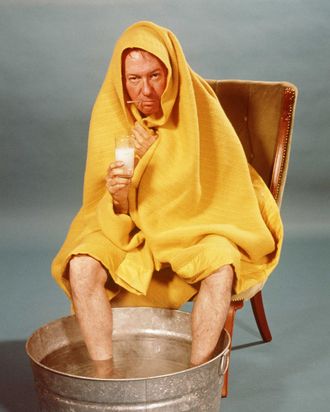
A complicated part of being human: living with the knowledge of your own impending death. So it’s somewhat understandable if your mind might have wandered into worst-case-scenario mode that time you had a bad bout of the flu, or thought a weird twinge in your finger was the beginnings of a medical emergency. (Dr. Google certainly doesn’t help.)
But for some people, worrying about their health becomes a debilitating cause of distress. Psychiatrists call this “health anxiety,” though you might call it hypochondria; whatever the term, it’s more common than you might think, affecting an estimated 1 to 2 percent of the population. But here’s the irony: People who are overly worried about their health are also more likely to actually develop some serious health problems, according to a large new study out of Norway, published this month in the journal BMJ Open. Sometimes being right does indeed suck.
Researchers studied the health of 7,052 participants of the Norwegian Hordaland Health Study, which is a long-term research project by the National Health Screening Service and the University of Bergen. Adding to the 13 years of already-collected data, the researchers assessed participants’ levels of health anxiety and their health. They found that 3.3 percent of the participants had had a heart attack or bout of acute angina, but there were twice as many people with health anxiety in this group than those without.
All in all, those with high levels of health anxiety were 70 percent more likely to develop heart disease. The researchers concluded that anxiety should be regarded as a risk factor for coronary heart disease.
This research didn’t assess causality — in other words, it can’t tell us why health anxiety was linked to a higher risk of heart disease. It could be that the hypochondriacs could sense some of those early symptoms that would eventually develop into disease, giving them good reason to worry. Or it could be that all that worrying could trigger heart issues, as other research has suggested.
“Stress causes us to secrete cortisol, a hormone which in the short term energizes us, but in the long term, in high doses, can have corrosive effects on various organs in the body and increase, for example, atherosclerosis, which is a risk factor for heart disease,” explained Ian Robertson, author of the upcoming book The Stress Test: How Pressure Can Make You Stronger and Sharper. For people with health anxiety, it’s particularly difficult to avoid this dangerous stress.
“Our bodies are always with us, and the various sensations and aches that all bodies experience are also always with us,” Robertson added. “If you are anxious about health, then cues for anxiety are omnipresent, unlike, for example, in people who are anxious about flying or heights.”
Line Iden Berge, one of the study co-authors and a researcher and PhD candidate at the University of Bergen in Norway, told Science of Us that before conducting the study, she’d guessed that the data would show the opposite — that hypochondriacs might be healthier than non-hypochondriacs. After all, their anxiety should be driving them to monitor their health more closely and schedule more frequent checkups than those without health anxiety. But in this study, those behaviors didn’t correlate with a decreased risk of coronary heart disease.
For that matter, health anxiety doesn’t always spur people to make more medical appointments. “What the medical profession does not understand is that people with health anxiety often both seek reassurance for some conditions but also avoid help when others would seek it,” Richard Morriss, a professor of psychiatry at the University of Nottingham, told Science of Us. (Morriss was not involved in this new research.) “Sometimes they seek help for trivial problems, but not for more serious ones.” So it’s also possible that their biggest potential health problems go undiagnosed and untreated.
It’s not a perfect study, Morriss said, as it included little ethnic diversity; he also noted that the study did not adequately control for some risk factors for heart disease, including diet and exercise. But it does bring up an intriguing question: Could the news that health anxiety may indeed be linked to poorer health only serve to increase hypochondriacs’ hypochondria? Morriss, for his part, doesn’t think so.
“I don’t think there are any substantial risks in talking publicly about health anxiety because people who have it are already very conscious of health information,” he said. “There may be a few vulnerable younger people made worse by discussing it, especially if it’s done in a patronizing, stigmatizing or discriminatory way. … But handled sensitively and sensibly, health anxiety is likely to be reduced in many people with simple explanation, while others might be offered psychological treatment, which can be delivered cheaply over the internet.” This could come in the form of webcam sessions with a therapist; alternatively, there are therapy apps that can help break negative and unhelpful thinking patterns, and guide users through meditation. The internet: the cause of and potential solution to our collective health anxiety.




